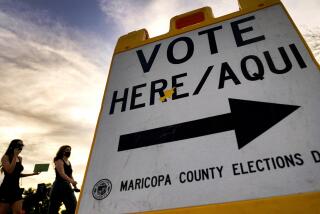Supreme Court voices skepticism about Voting Rights Act
- Share via
WASHINGTON — The historic Voting Rights Act appeared to be in deep trouble Wednesday after the Supreme Court’s conservative justices argued during a racially charged debate that targeting the South for special scrutiny was no longer fair.
The unusually tense discussion split along ideological lines. Justices from the left and right took turns arguing the case — and arguing with one another over whether racism and racial discrimination remain problems.
At one point, Justice Antonin Scalia referred to the law as a “perpetuation of racial entitlement,” a phrase that irked Justice Sonia Sotomayor, who voiced strong objection earlier this week to a Texas prosecutor’s focus on defendants’ race. After Scalia spoke, she repeatedly pressed a lawyer for Alabama’s Shelby County to say whether “the right to vote is a racial entitlement.” He steered around the question.
When the Obama administration’s top courtroom lawyer rose to defend the law, Chief Justice John G. Roberts Jr. asked whether the administration thought “citizens in the South are more racist than citizens in the North.”
No, U.S. Solicitor Gen. Donald Verrilli Jr. said, but there is reason to believe that discrimination in voting remains more of a problem across the South.
The case concerns the 1965 law’s Section 5, which requires nine states, mostly in the South, to submit changes in voting rules or election laws to federal officials for “pre-clearance” before they can take effect. In 2006, Congress renewed this requirement for 25 more years.
Shelby County sued to challenge the law, arguing that it is outdated and unfairly singles out Southern states based on their history of discrimination. If the high court were to strike down this part of the law, it would still be illegal for cities or states to change their voting rules or election districts so as to discriminate against African Americans or Latinos. Congress could still revise the law, and the government or civil rights lawyers still could file lawsuits to contest such changes. This often takes much time and money, however.
Civil rights advocates say the Voting Rights Act remains a powerful tool for stopping changes in election rules that hurt minorities and prevent them from voting. They include changes as simple as switching the location of a polling place weeks before an election.
“There are thousands and thousands of these under-the-radar-screen changes,” Verrilli told the court. The current law serves as a “deterrent” to this “kind of mischief,” he said, but a lawsuit could come too late to fix the problem.
The conservatives did not sound convinced. When Verrilli noted that the Senate had voted unanimously in 2006 to extend the law and its special oversight for much of the South, Scalia said he was not impressed.
“Whenever a society adopts racial entitlements, it is very difficult to get out of them through the normal political processes,” he said. “This is not the kind of question you can leave to Congress.”
Justice Elena Kagan objected, noting that the Senate extended the law by a 98-0 vote. “That sounds like a good argument to me, Justice Scalia,” she said. It means “every senator from a covered state” in the South said the law was still needed.
The four liberals expressed surprise that the challenge to the law had come from Alabama. “Under any formula that Congress could devise, it would capture Alabama,” Kagan said, noting the state’s prominent history of discrimination. Justice Ruth Bader Ginsburg cited testimony that Alabama, Mississippi and Louisiana had the “worst records” for voting discrimination.
Roberts countered that the South had done a good job of registering black voters. “Do you know which state has the worst ratio of white voter turnout to African American turnout?” he asked Verrilli. “Massachusetts,” Roberts said in answer to his own question. “Do you know what has the best, where African American turnout actually exceeds white turnout? Mississippi.”
Ginsburg conceded that registering black voters may not be a serious problem today, but she said Congress had evidence that Southern municipalities still sometimes redraw election districts to screen out black candidates.
As usual, all eyes were on Justice Anthony M. Kennedy, whose vote is likely to be decisive. He criticized Congress for not revising the 1960s-era formula for deciding which states received special oversight.
“If Congress is going to single out separate states,” he said, “it should use criteria that are relevant” to current problems.
Verrilli responded that both the court and Congress had steadily supported the law in the past.
“Well, the Marshall Plan [after World War II] was very good too,” Kennedy replied. “But times change.”
Four years ago, Justice Clarence Thomas voted alone to strike down the Voting Rights Act. Although he did not ask questions Wednesday, he is certain to join with the other conservatives in the case of Shelby County vs. Holder if they strike down Section 5.
More to Read
Sign up for Essential California
The most important California stories and recommendations in your inbox every morning.
You may occasionally receive promotional content from the Los Angeles Times.












